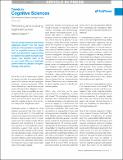| dc.contributor.author | Saxe, Rebecca | |
| dc.date.accessioned | 2023-03-31T14:59:56Z | |
| dc.date.available | 2023-03-31T14:59:56Z | |
| dc.date.issued | 2022 | |
| dc.identifier.uri | https://hdl.handle.net/1721.1/150317 | |
| dc.description.abstract | How do people perceive and pursue legitimate power? For the social sciences, this question is venerable. Yet, for cognitive science, it offers fresh and generative opportunities to explore how adults evaluate legitimacy, how children learn to do so, and what difference legitimate power makes for people's thoughts, feelings, and actions. | en_US |
| dc.language.iso | en | |
| dc.publisher | Elsevier BV | en_US |
| dc.relation.isversionof | 10.1016/J.TICS.2022.08.008 | en_US |
| dc.rights | Creative Commons Attribution-NonCommercial-NoDerivs License | en_US |
| dc.rights.uri | http://creativecommons.org/licenses/by-nc-nd/4.0/ | en_US |
| dc.source | MIT web domain | en_US |
| dc.title | Perceiving and pursuing legitimate power | en_US |
| dc.type | Article | en_US |
| dc.identifier.citation | Saxe, Rebecca. 2022. "Perceiving and pursuing legitimate power." Trends in Cognitive Sciences, 26 (12). | |
| dc.contributor.department | Massachusetts Institute of Technology. Department of Brain and Cognitive Sciences | en_US |
| dc.relation.journal | Trends in Cognitive Sciences | en_US |
| dc.eprint.version | Author's final manuscript | en_US |
| dc.type.uri | http://purl.org/eprint/type/JournalArticle | en_US |
| eprint.status | http://purl.org/eprint/status/PeerReviewed | en_US |
| dc.date.updated | 2023-03-31T14:55:09Z | |
| dspace.orderedauthors | Saxe, R | en_US |
| dspace.date.submission | 2023-03-31T14:55:10Z | |
| mit.journal.volume | 26 | en_US |
| mit.journal.issue | 12 | en_US |
| mit.license | PUBLISHER_CC | |
| mit.metadata.status | Authority Work and Publication Information Needed | en_US |
